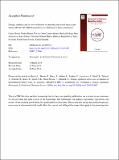Files in this item
Design, synthesis and in vitro evaluation of benzothiazole-based ureas as potential ABAD/17β-HSD10 modulators for Alzheimer’s disease treatment
Item metadata
| dc.contributor.author | Hroch, Lukas | |
| dc.contributor.author | Benek, Ondrej | |
| dc.contributor.author | Guest, Patrick | |
| dc.contributor.author | Aitken, Laura | |
| dc.contributor.author | Soukup, Ondrej | |
| dc.contributor.author | Janockova, Jana | |
| dc.contributor.author | Musil, Karel | |
| dc.contributor.author | Dohnal, Vlastimil | |
| dc.contributor.author | Dolezal, Rafael | |
| dc.contributor.author | Kuca, Kamil | |
| dc.contributor.author | Smith, Terry K | |
| dc.contributor.author | Gunn-Moore, Frank J | |
| dc.contributor.author | Musilek, K | |
| dc.date.accessioned | 2017-08-15T08:44:02Z | |
| dc.date.available | 2017-08-15T08:44:02Z | |
| dc.date.issued | 2016-08-01 | |
| dc.identifier | 243084363 | |
| dc.identifier | 13411b13-1dd3-495c-8f6f-8b0f59d234fd | |
| dc.identifier | 84973563591 | |
| dc.identifier | 000380574100058 | |
| dc.identifier.citation | Hroch , L , Benek , O , Guest , P , Aitken , L , Soukup , O , Janockova , J , Musil , K , Dohnal , V , Dolezal , R , Kuca , K , Smith , T K , Gunn-Moore , F J & Musilek , K 2016 , ' Design, synthesis and in vitro evaluation of benzothiazole-based ureas as potential ABAD/17β-HSD10 modulators for Alzheimer’s disease treatment ' , Bioorganic and Medicinal Chemistry Letters , vol. 26 , no. 15 , pp. 3675-3678 . https://doi.org/10.1016/j.bmcl.2016.05.087 | en |
| dc.identifier.issn | 0960-894X | |
| dc.identifier.other | ORCID: /0000-0003-3422-3387/work/34730414 | |
| dc.identifier.other | ORCID: /0000-0001-7259-4491/work/31318395 | |
| dc.identifier.uri | https://hdl.handle.net/10023/11451 | |
| dc.description | This work was supported by the Ministry of Health of the Czech Republic (no. NV15-28967A), Charles University in Prague (no. GAUK B-CH/992214, SVV 260 291) and the Alzheimer’s Society (specifically The Barcopel Foundation). This research is part-funded by the MSD Scottish Life Sciences fund. | en |
| dc.description.abstract | Amyloid-beta peptide (Aβ) has been recognized to interact with numerous proteins, which may lead to pathological changes in cell metabolism of Alzheimer’s disease (AD) patients. One such known metabolic enzyme is mitochondrial amyloid-binding alcohol dehydrogenase (ABAD), also known as 17β-hydroxysteroid dehydrogenase type 10 (17β-HSD10). Altered enzyme function caused by the Aβ-ABAD interaction, was previously shown to cause mitochondrial distress and a consequent cytotoxic effect, therefore providing a feasible target in AD drug development. Based on previous frentizole derivatives studies, we report two novel series of benzothiazolyl ureas along with novel insights into the structure and activity relationships for inhibition of ABAD. Two compounds ( 37 , 39 ) were identified as potent ABAD inhibitors, where compound 39 exhibited comparable cytotoxicity with the frentizole standard; however, one-fold higher cytotoxicity than the parent riluzole standard. The calculated and experimental physical chemical properties of the most potent compounds showed promising features for blood-brain barrier penetration. | |
| dc.format.extent | 4 | |
| dc.format.extent | 345981 | |
| dc.language.iso | eng | |
| dc.relation.ispartof | Bioorganic and Medicinal Chemistry Letters | en |
| dc.subject | Alzheimer's disease (AD) | en |
| dc.subject | Amyloid-beta peptide (Aβ) | en |
| dc.subject | Mitochondria | en |
| dc.subject | Amyloid binding alcohol dehydrogenase (ABAD) | en |
| dc.subject | 17β-hydroxysteroid dehydrogenase type 10 (17β-HSD10) | en |
| dc.subject | Benzothiazole | en |
| dc.subject | Riluzole | en |
| dc.subject | R Medicine (General) | en |
| dc.subject | QR Microbiology | en |
| dc.subject | NDAS | en |
| dc.subject.lcc | R1 | en |
| dc.subject.lcc | QR | en |
| dc.title | Design, synthesis and in vitro evaluation of benzothiazole-based ureas as potential ABAD/17β-HSD10 modulators for Alzheimer’s disease treatment | en |
| dc.type | Journal item | en |
| dc.contributor.sponsor | Alzheimer's Society | en |
| dc.contributor.sponsor | Scottish Funding Council | en |
| dc.contributor.institution | University of St Andrews. School of Biology | en |
| dc.contributor.institution | University of St Andrews. East of Scotland Bioscience Doctoral Training Partnership | en |
| dc.contributor.institution | University of St Andrews. Biomedical Sciences Research Complex | en |
| dc.contributor.institution | University of St Andrews. Institute of Behavioural and Neural Sciences | en |
| dc.identifier.doi | https://doi.org/10.1016/j.bmcl.2016.05.087 | |
| dc.description.status | Peer reviewed | en |
| dc.date.embargoedUntil | 2017-05-30 | |
| dc.identifier.grantnumber | 188 PG-2012-172 | en |
| dc.identifier.grantnumber | MSDPD03 | en |
This item appears in the following Collection(s)
Items in the St Andrews Research Repository are protected by copyright, with all rights reserved, unless otherwise indicated.

